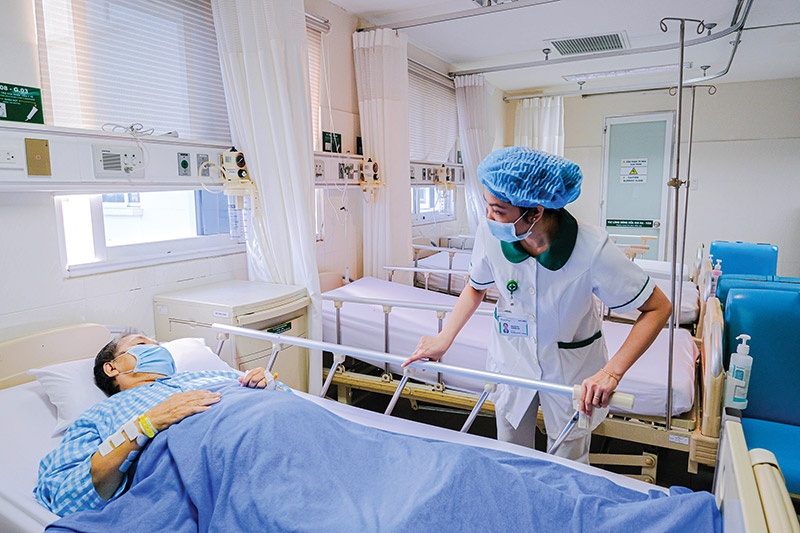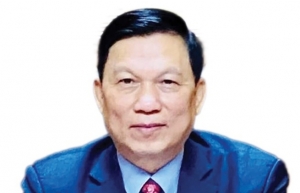Post-pandemic staff headaches continuing for local hospitals
According to Nguyen Thi Le Thu, director of Marketing and Business Development at FV Hospital, the hospital is going to build a new facility to meet the growing need for high-quality healthcare services in Ho Chi Minh City and neighbouring areas. “We plan to recruit more doctors and nurses to work at the new facility,” she told VIR. “FV is an ideal working environment that many health workers are looking for.”
 |
| Many healthcare staff have switched jobs due to pandemic stress and low salaries, Le Toan |
The French-funded hospital now boasts over 130 doctors from many countries, including 116 full-time. The hospital receives more than 200,000 patients a year, most Vietnamese but also many expatriates.
Like FV, Hanoi French Hospital is hiring new medical and support staff to support its development plan.
“We have reactivated our recruitment for European specialist doctors and expect to welcome at least six more before the end of the year,” said CEO Jef Peeters. “We continue to work with international partners, particularly training hospitals in France, for advanced specialised training and programme development and are happy to have unrestricted travel in support of those programmes.”
While a good working environment and well-paid job are among the most important factors to help hospitals retain talents, many state-owned institutions are struggling with manpower shortfall as a massive number of health workers switch professions.
At least one senior doctor has left Dong Nai General Hospital after years of working there and previously being honoured by Dong Nai People’s Committee for his contributions during the peak of the COVID-19 pandemic. It was reported that the main reason for quitting the high-profile role was due to the toll taken on him with long, harsh working hours during the country’s time of need.
On top of that, a huge number of doctors and nursing staff have decided to quit their jobs in the same hospital. Director Dr. Ngo Duc Tuan admitted that the hospital suffered from about 100 employee losses in 2021, including 29 doctors, 30 nurses, technicians, and other positions.
According to local authorities in Dong Nai, 230 doctors, nursing staff, and technicians at state-run health facilities have left their job in the first half of 2022. This number is much higher than in previous years.
Meanwhile, Huynh Minh Chin, deputy director of Binh Duong Department of Health, said that about 300 staff at grassroots health facilities in the southern province have resigned because of low salaries, unreasonable working environment, work overload, and fewer opportunities to improve professional skills. The province is facing a lack of nearly 600 staff in the form of doctors and midwives, mostly for grassroots health facilities.
In addition, the 1,500-bed General Hospital, which is going to be put into operation in Binh Duong, is seeking new staff. “While people’s healthcare demands are rising and more varied, the capacity of the local healthcare sector remains limited because of manpower shortfall,” Chin said. “Training and recruitment is still challenging. Annually, the number of recruited doctors and other health staff fails to meet demands.”
According to Ministry of Health (MoH) statistics, nearly 900 health staff in Hanoi have resigned from their job in the past two years, with 250 quitting in Q1 of this year alone. In Ho Chi Minh City, the number was more than 1,000 in 2021, and nearly 400 in the first quarter of 2022.
The Vietnam National Union of Health Workers, which noted that over 9,300 health workers across the country have left their jobs over the past 18 months, saying that low salaries and allowances were the top of many reasons for getting out.
It explained that currently, the salary of a graduating doctor is around VND3.48 million ($150) a month before incentives. The average wages only partly help many doctors cover their daily expenses.
At recent meetings, including one in mid-July about human resources for the sector, the prime minister asked the MoH to work with ministries and agencies to study and amend Decree No.56/2011/ND-CP regulating preferential allowances for staff at state-owned health facilities, and supporting policies for those hit by the pandemic.
 | Accelerating the vital digital transformation of hospitals In recent years the healthcare sector has made breakthroughs in IT application, and approaching digital technologies like the Internet of Things, AI, VR, cloud computing, big data, and more. All hospitals nationwide deploy hospital management information systems, while interconnectivity with the healthcare insurance payment verification system has reached 99.5 per cent. Around 20 health facilities deploy electronic medical records in substitution for paper ones, and 23 hospitals deploy picture archiving and communication systems. |
What the stars mean:
★ Poor ★ ★ Promising ★★★ Good ★★★★ Very good ★★★★★ Exceptional
Themes: Healthcare Platform
- PM outlines new tasks for healthcare sector
- Opella and Long Chau join forces to enhance digestive and bone health
- Hanoi intensifies airport monitoring amid Nipah disease risks
- Cosmetics rules set for overhaul under draft decree
- Policy obstacles being addressed in drug licensing and renewal
Related Contents
Latest News
More News
- PM outlines new tasks for healthcare sector (February 25, 2026 | 16:00)
- Myriad risks ahead, but ones Vietnam can confront (February 20, 2026 | 15:02)
- Vietnam making the leap into AI and semiconductors (February 20, 2026 | 09:37)
- Funding must be activated for semiconductor success (February 20, 2026 | 09:20)
- Resilience as new benchmark for smarter infrastructure (February 19, 2026 | 20:35)
- A golden time to shine within ASEAN (February 19, 2026 | 20:22)
- Vietnam’s pivotal year for advancing sustainability (February 19, 2026 | 08:44)
- Strengthening the core role of industry and trade (February 19, 2026 | 08:35)
- Future orientations for healthcare improvements (February 19, 2026 | 08:29)
- Infrastructure orientations suitable for a new chapter (February 19, 2026 | 08:15)

 Tag:
Tag:



















 Mobile Version
Mobile Version